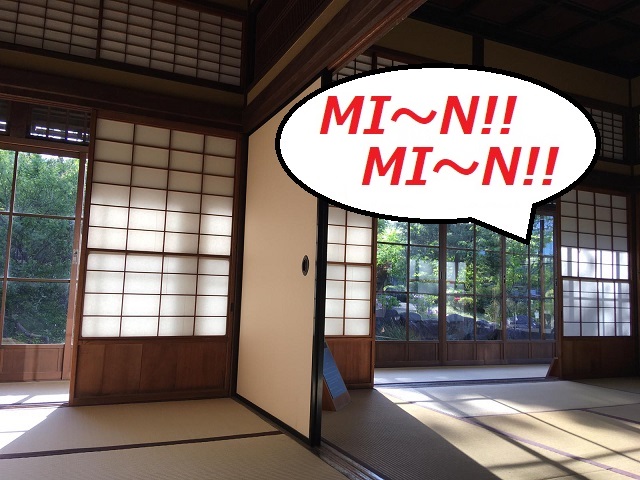
For many people in Japan, there’s no more welcome sound than the incredibly loud whining buzz of the seasonal insects.
Japanese culture has a deep appreciation for the changing of the seasons. That’s why you’ll often hear people waxing poetic about koyo, the red leaves of autumn, yukimiburo, open-air hot springs surrounded by blankets of snow in winter, and sakura, the cherry blossoms that bloom each spring.
Oh, and of course, the mi-n mi-n of summer, referring to cries of the cicadas. Yes, the loud buzzing of the creepy-looking insects, which to the uninitiated can sound like the whine of electrical power lines, is music to the ears of many Japanese people.
▼ As proof, here’s a 90-minute video made up of pretty much nothing but cicada cries that has over four and a half million views.
So why does Japan have such a soft spot for cicada (or semi, as they’re called in Japanese) sounds? To get a better idea, I asked the members of our Japanese-language writing team.
Casey: “Hey, so I was wondering how everybody feels about the sound cicadas make.”
P.K. Sanjun: “I love it. Well, not so much the sound itself, but the way it makes me feel. It’s like, ‘Yep, summer is here!’”
Go Hatori: “Love it! Totally gets me into the season. If I don’t hear them, I start to get uneasy, like we’re going to miss out on having a proper summer.”
Takahashi Harada: “Yeah, it’s part of the summer atmosphere, so I like it.”
Masanuki Sunakoma: “I love the cicada sounds! I like them so much that I wish they’d sing even more, even in the winter! I guess it’s because I like summer so much. Ah, but it kind of freaks me out when cicadas cling to my screen door, so I wish they’d stop doing that.”
Seiji Nakazawa: “Love it.”
OK, so that was pretty unanimous. But maybe it’s an acquired taste?
Casey: “So did you all feel that way when you were kids too, or did your opinion change as you got older?”
P.K.: “I’m pretty sure I’ve always liked it”
Go: “Loved the sound since I was a kid, and I haven’t changed a bit!”
Takahashi: “Me too, pretty much.”
Masanuki: “Yeah. When I was a kid, it was essentially ‘The Sound of Summer Vacation.”
The one outlier here was Seiji, who changed his mind about cicadas a while back because of, well, you.
Seiji: “I only started liking it a few years ago. Actually, until I turned 33, I hated summer, and since cicadas reminded me of the season, I thought the sound was totally annoying.
I’ve always had the image that summer is a fun season if you’ve got someone to do something with, but I didn’t have a lot of friends in my teens, 20s, and early 30s. So I didn’t have anyone to do those fun summer things with, and was just sort of waiting for summer to end every year.
But now, even if I’m by myself, I feel like I’m spending time with our site’s readers, and there’s a lot of interesting stuff to write about in the summer. So really, it’s thanks to this job, and the people who read our articles, that I like summer now, and the sound of the cicadas too.”
▼ Thanks for helping Seiji get a more positive outlook on summer, everybody!
Again, it’s not so much the sound itself that people seem to like, but the feelings it stirs in them.
Casey: So when you hear the cicadas sing, what sort of mental image, or memories, does the sound trigger?
P.K.: “Cicadas spend about seven years underground, and then they only come out for about a week, right? And in those seven years, you gotta figure that some of the ones here in Tokyo had the ground they burrowed into paved over with asphalt. So when I do hear one singing, I always think “You worked so hard to get here! It took seven years, but you made it, so sing all you want!”
Go: “The sound always brings back memories from summer vacations when I was still a little kid.”
Takahashi: “I lived in the countryside growing up, and we had a lot more cicadas than here in the city. So when I hear them, it’s almost like I’m looking at pictures of my hometown.”
Masanuki: “Reminds me of doing radio taiso calisthenics in the mornings on summer vacation, or of hanging out in the temporary beach house restaurants they build on the sand..”
Seiji: “It brings back memories of the hill in front of the house I lived in growing up, and the evening squalls in summer. We lived in the countryside, and after the rain stopped the cicadas would start up, and it was like a wall of sound. You know how in the first volume of the Evangelion manga there’s a poem that goes like ‘There are so many cicadas now that I can’t hear anything else’? That’s what it felt like.”
About this time Mr. Sato sauntered into the discussion, and as you might guess, he’s got a somewhat unique perspective.
“I wouldn’t say I especially like or dislike the sound of cicadas, but yeah, they definitely make it feel like it’s summer. When I was a kid, I lived in the countryside too, and we were really close to the mountains, so the cicadas were really loud and annoying. Here in Tokyo, though, there aren’t so many, and it’s not so bad.
We have a couple different kinds of cicadas in Japan, and a lot of people like the minminzemi (hyalessa maculaticollis) and tsukotsukoboshi (meimuna opalifera) that come out in July. But me, I get more emotional at the sound of higurashi (tanna japonensis). Those start singing later in August, and their rattle gives me a sad, lonely feeling, like ‘Summer is ending.’”
▼ A video of higurashi cries, if you’re in the mood to be Sato-sad.
As for me, my very first trip to Japan didn’t coincide with cicada season. In the five-year gap until I took my second, I spent enough time watching Japanese TV dramas and anime that I was braced for the sound, so when I arrived in Japan on trip number two, right in the middle of the summer, I put the most positive spin I could on it by taking the sound of the cicadas as Japan saying “Welcome back!” I’ve spent at least part of every summer since then in Japan, and while my ears still probably wouldn’t find the sound all that pleasant if it was removed from than context, my heart honestly gets a little excited every year when I hear the first mi-n mi-n of the season.
Photos ©SoraNews24
● Want to hear about SoraNews24’s latest articles as soon as they’re published? Follow us on Facebook and Twitter!
Follow Casey on Twitter, where he loves pretty much everything about summer in Japan.


 Singing, ticking timebombs – 5 facts about the special significance of cicadas in Japan
Singing, ticking timebombs – 5 facts about the special significance of cicadas in Japan Summer in Japan doesn’t feel like a Japanese summer this year, many are saying
Summer in Japan doesn’t feel like a Japanese summer this year, many are saying Japanese high school student makes gross yet cool action figure out of bugs
Japanese high school student makes gross yet cool action figure out of bugs What’s the best way to deal with an abundance of cicada skins? Build Godzilla, of course!
What’s the best way to deal with an abundance of cicada skins? Build Godzilla, of course! The Great Obon Disaster: A fable of cicadas, dancing, and cats
The Great Obon Disaster: A fable of cicadas, dancing, and cats How to order snacks on a Shinkansen bullet train in Japan
How to order snacks on a Shinkansen bullet train in Japan New Nintendo Lego kit is a beautiful piece of moving pixel art of Mario and Yoshi【Photos】
New Nintendo Lego kit is a beautiful piece of moving pixel art of Mario and Yoshi【Photos】 Demon Slayer: Kimetsu no Yaiba gets new roller coaster attractions and food at Universal Studios Japan
Demon Slayer: Kimetsu no Yaiba gets new roller coaster attractions and food at Universal Studios Japan New samurai glasses are Japan’s latest weird must-have souvenir
New samurai glasses are Japan’s latest weird must-have souvenir Finally! Nintendo Japan expands Switch 8-bit controller sales to everybody, Online member or not
Finally! Nintendo Japan expands Switch 8-bit controller sales to everybody, Online member or not Apartment in Japan explodes following bizarre series of events【Video】
Apartment in Japan explodes following bizarre series of events【Video】 McDonald’s adds a new Cheese Bacon Potato Pie to its menu in Japan for a limited time
McDonald’s adds a new Cheese Bacon Potato Pie to its menu in Japan for a limited time Nintendo history you can feel – Super NES, N64, and GameCube controllers become capsule toys
Nintendo history you can feel – Super NES, N64, and GameCube controllers become capsule toys Tokyo Station’s perfect breakfast spot might just be this izakaya Japanese-style pub
Tokyo Station’s perfect breakfast spot might just be this izakaya Japanese-style pub High-fashion Totoro cuddle purse is like an elegant stroll in the forest【Photos】
High-fashion Totoro cuddle purse is like an elegant stroll in the forest【Photos】 Hello, cosmetics! Clinique teams up with Hello Kitty this summer for first-time collaboration
Hello, cosmetics! Clinique teams up with Hello Kitty this summer for first-time collaboration “The most Delicious Cup Noodle in history” – Japan’s French Cup Noodle wins our heart【Taste test】
“The most Delicious Cup Noodle in history” – Japan’s French Cup Noodle wins our heart【Taste test】 Starbucks releases a cute Frappuccino and Unicorn Cake…but not in Japan
Starbucks releases a cute Frappuccino and Unicorn Cake…but not in Japan Kyoto Tower mascot termination reveals dark side behind cute Japanese characters
Kyoto Tower mascot termination reveals dark side behind cute Japanese characters McDonald’s Japan’s Soft Twist Tower: A phantom ice cream only sold at select branches
McDonald’s Japan’s Soft Twist Tower: A phantom ice cream only sold at select branches Yabai Ramen: What makes this Japanese ramen so dangerous?
Yabai Ramen: What makes this Japanese ramen so dangerous? Japanese government wants to build luxury resorts in all national parks for foreign tourists
Japanese government wants to build luxury resorts in all national parks for foreign tourists To combat declining birth rate, Japan to begin offering “Breeding Visas” to foreigners
To combat declining birth rate, Japan to begin offering “Breeding Visas” to foreigners 10 things you should buy at 7-Eleven in Japan
10 things you should buy at 7-Eleven in Japan Studio Ghibli releases anime heroine cosplay dresses that are super comfy to wear
Studio Ghibli releases anime heroine cosplay dresses that are super comfy to wear Woman charged for driving suitcase without a license in Osaka
Woman charged for driving suitcase without a license in Osaka Studio Ghibli unveils My Neighbour Totoro miniature house model
Studio Ghibli unveils My Neighbour Totoro miniature house model Kyoto experiencing problems with foreign tourists not paying for bus fares, but not on purpose
Kyoto experiencing problems with foreign tourists not paying for bus fares, but not on purpose Fighting mild hunger with a Japanese soda that turns into jelly in the stomach【Taste test】
Fighting mild hunger with a Japanese soda that turns into jelly in the stomach【Taste test】 Studio Ghibli’s Howl’s Moving Castle tapestry unveiled in Japan for first time
Studio Ghibli’s Howl’s Moving Castle tapestry unveiled in Japan for first time McDonald’s new Happy Meals offer up cute and practical Sanrio lifestyle goods
McDonald’s new Happy Meals offer up cute and practical Sanrio lifestyle goods Sales of Japan’s most convenient train ticket/shopping payment cards suspended indefinitely
Sales of Japan’s most convenient train ticket/shopping payment cards suspended indefinitely Sold-out Studio Ghibli desktop humidifiers are back so Totoro can help you through the dry season
Sold-out Studio Ghibli desktop humidifiers are back so Totoro can help you through the dry season Japanese government to make first change to romanization spelling rules since the 1950s
Japanese government to make first change to romanization spelling rules since the 1950s Foreigner’s request for help in Tokyo makes us sad for the state of society
Foreigner’s request for help in Tokyo makes us sad for the state of society Ghibli founders Toshio Suzuki and Hayao Miyazaki contribute to Japanese whisky Totoro label design
Ghibli founders Toshio Suzuki and Hayao Miyazaki contribute to Japanese whisky Totoro label design Doraemon found buried at sea as scene from 1993 anime becomes real life【Photos】
Doraemon found buried at sea as scene from 1993 anime becomes real life【Photos】 Tokyo’s most famous Starbucks is closed
Tokyo’s most famous Starbucks is closed Princesses, fruits, and blacksmiths: Study reveals the 30 most unusual family names in Japan
Princesses, fruits, and blacksmiths: Study reveals the 30 most unusual family names in Japan 8-year-old discovers untimely deaths of 15 percent of Kyoto’s cicada population
8-year-old discovers untimely deaths of 15 percent of Kyoto’s cicada population Antinomy: Talking to Urbangarde about their vision, music, and lying to fans
Antinomy: Talking to Urbangarde about their vision, music, and lying to fans Pikachus overrunning Yokohama in the cutest rodent invasion ever 【Video】
Pikachus overrunning Yokohama in the cutest rodent invasion ever 【Video】 The 100 Soundscapes of Japan: A list of Japan’s greatest natural, cultural, and industrial sounds
The 100 Soundscapes of Japan: A list of Japan’s greatest natural, cultural, and industrial sounds Master Ball bug cage lets you finally catch even the most powerful insects out there
Master Ball bug cage lets you finally catch even the most powerful insects out there We take a close-up look at some Japanese street food found at summer festivals【Photos】
We take a close-up look at some Japanese street food found at summer festivals【Photos】 This year’s contest to choose Japan’s greatest mascot attracting some shady characters
This year’s contest to choose Japan’s greatest mascot attracting some shady characters The best soba restaurant on Yakushima island, according to locals
The best soba restaurant on Yakushima island, according to locals Summer is coming! Stay cool with this retro-style shaved-ice maker!
Summer is coming! Stay cool with this retro-style shaved-ice maker! Celebrate summer in style with a cold drink in these color-changing firework glasses【Video】
Celebrate summer in style with a cold drink in these color-changing firework glasses【Video】 As summer comes to an end, it’s time to get ready for a plague of mosquitoes in Japan
As summer comes to an end, it’s time to get ready for a plague of mosquitoes in Japan Service area in Shizuoka goes all out for the biggest and baddest Evangelion collaboration ever
Service area in Shizuoka goes all out for the biggest and baddest Evangelion collaboration ever How do Japan’s host club hosts get their professional names? We talk with five Kabukicho pros
How do Japan’s host club hosts get their professional names? We talk with five Kabukicho pros The pros and cons of having otaku parents, according to Japanese anime fans
The pros and cons of having otaku parents, according to Japanese anime fans We tried torching sushi with a “flamethrower” to increase its flavor! 【Video】
We tried torching sushi with a “flamethrower” to increase its flavor! 【Video】
Leave a Reply